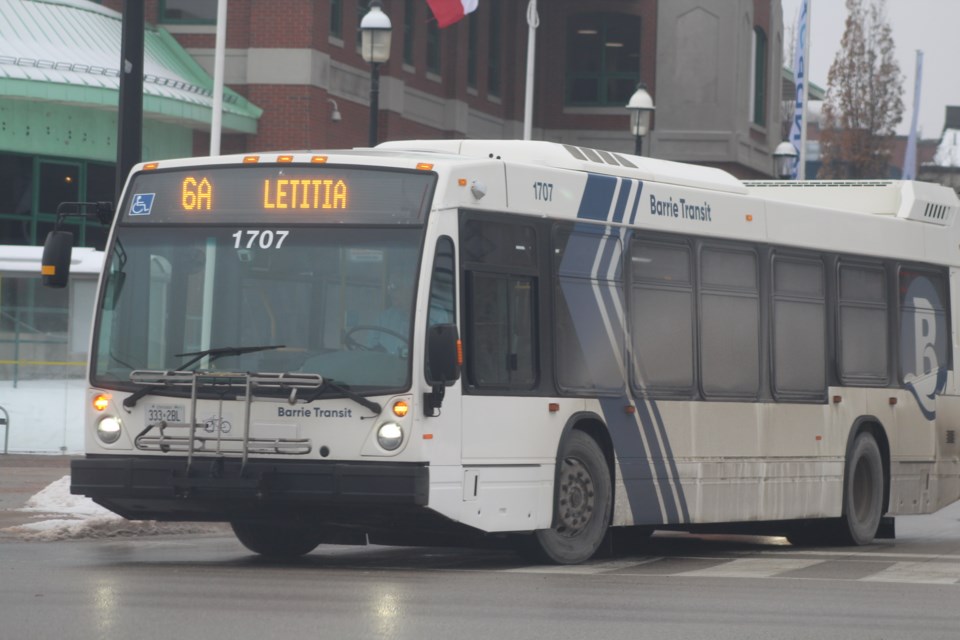Barrie Transit could have its first battery electric bus (BEB) ready for service in 2023. It's part of a pilot project eventually leading to emission reductions if the fleet is converted, but it comes with a substantial price tag.
That is why Mayor Jeff Lehman does not support this plan, despite its approval by city council. He says the $1.7 million cost for the pilot project and another $135.9 million compared to status-quo diesel buses operation in the next 20 years is too much.
“This one is far too expensive at this time,” he said. “While the emissions reductions are significant in percentage terms, let’s not forget there are only about 30-40 buses on the road at any given time.
“While electric buses may one day make sense, we would make a far greater impact using this kind of money to expand service,” Lehman said. “Since each bus can take up to 40 cars off the road, imagine the emissions savings if we spent a fraction of this cost expanding service, making service more convenient or more frequent, thereby encouraging more people to ride transit.”
City staff say using BEB vehicles provides many benefits. Most prevalent is the elimination of tailpipe emissions that typically emit greenhouse gases and other harmful air contaminants into the environment. And when compared to diesel, BEBs would reduce emissions by as much as 51 per cent during a 20-year period, staff predict.
Their carbon footprint is directly proportional to the electrical grid they are connected to and BEBs have fewer components and less moving parts than a diesel bus, an advantage that would likely result in reduced maintenance and part costs over the lifecycle of the vehicle. This is unproven at this time, however, as no BEB has been in operation for a complete lifecycle in North America.
The capital costs associated with the pilot program are estimated at $1.7 million - $1.2 million for one BEB and $500,000 for the charging infrastructure - and will be funded from federal gas tax reserve.
The BEB adoption scenario shows an additional expense of $135.9 million compared to diesel buses during a 20-year period, representing a 35 per cent expenditure increase.
“If external funding is available, the conversion to electric might make more sense, or if the costs come down in the future,” Lehman said. “In the meantime this is not the most effective way to fight climate change and is a very expensive use of tax dollars.”
In addition to council endorsing, in principle, the conversion of Barrie Transit’s fleet to BEBs, the purchase of one conventional BEB and accompanying charging infrastructure, totalling $1.7 million, will be added to the 2021 capital budget.
Council also directed city staff to make efforts to leverage funding from upper levels of government when those programs become available to reduce the commitment from the federal gas tax reserve. And submit applications for grants that would reduce capital expenditures or enhance capital projects associated with BEBs.
Staff anticipate funding from senior levels of government to support the transition to alternative fuel vehicles will become available in the near future. In early 2021 the federal government announced it will be providing a $2.5-billion funding program for the integration of electric buses between 2021 and 2025. Details of the program have not yet been released.
Lehman said he might take another crack at the BEB plan at budget time.
“My feeling is this is perhaps best addressed as part of capital planning for the budget,” he said. “It may be that there is external funding to change the economics.”
Council also approved a full-time city employee, beginning in November 2021, to develop and execute both the pilot program and implementation plan for transit’s fleet conversion, at an estimated total cost of $150,000 annually.
The city’s corporate fleet conversion to battery electric and compressed natural gas fuelled vehicles was also approved, in principle, June 28 by council. This would result in a 13 per cent emission reduction during a 20-year period, with the maximum reduction of 25 per cent reached in year 20, at a net annual cost of $500,000.
“The corporate fleet plan is an excellent first start and makes much more environmental and fiscal sense,” Lehman said.
Barrie Transit’s fleet consists of 63 vehicles, including 46 conventional transit buses and 17 specialized transit vehicles. The Welham Road transit garage was constructed as part of a 20-year, design-build-operate contract. Completed in 2015, it permits the indoor storage of all existing fleet. Designed to accommodate as many as 88 vehicles, the facility is beginning to approach indoor storage capacity.
The facility and service contract were built on the premise that the service provider would be operating and maintaining both the fleet and a facility designed specifically for diesel or gasoline fuelled fleet until 2035. The BEB conversion would require a secondary facility by approximately 2033, staff say.
It’s expected that BEBs will comprise more than 67 per cent of the global bus fleet by 2040.


.jpg;w=120;h=80;mode=crop)
